|
|
|
Sort Order |
|
|
|
Items / Page
|
|
|
|
|
|
|
| Srl | Item |
| 1 |
ID:
142658
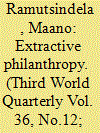

|
|
|
|
|
| Summary/Abstract |
At the centre of the conservation enterprise are the interactions of various actors who display a great deal of environmental ethic. Private landowners have embraced this ethic to protect their property rights and increase land value while contributing to the conservation of nature and to rural development. In this paper I draw examples from the lowveld in South Africa to argue that there is a seamless connection between philanthropy, labour and land claims in private nature reserves, and that post-apartheid conditions have enabled such a connection to emerge. Philanthropy allows private owners to structure and control labour, while directly or indirectly affecting the trajectory of land claims in the area.
|
|
|
|
|
|
|
|
|
|
|
|
|
|
|
|
| 2 |
ID:
142655
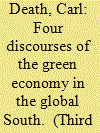

|
|
|
|
|
| Summary/Abstract |
This article identifies four contrasting global discourses of the green economy in contemporary usage: green resilience, green growth, green transformation and green revolution. These four discourses are manifested in recent green economy national strategies across the global South, including in Ethiopia, India, South Korea and Brazil. Disaggregating these discourses is politically important, and shows their different implications for broader political economies of the green state in the global South.
|
|
|
|
|
|
|
|
|
|
|
|
|
|
|
|
| 3 |
ID:
142654
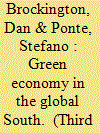

|
|
|
|
|
| Summary/Abstract |
As multiple visions for a Green Economy seek to become real, so are green economic initiatives in the global South multiplying. These can offer integration into wealth-generating markets – as well as displacement, alienation, conflict and opportunities for ‘green washing’. The articles included in this collection bring together a multidisciplinary team of scholars and a range of case studies, from forestry governance to tourism to carbon finance, to provide nuanced analyses of Green Economy experiences in the global South – examining the opportunities they provide, the redistributions they entail and the kinds of resistance they face.
|
|
|
|
|
|
|
|
|
|
|
|
|
|
|
|
| 4 |
ID:
142661
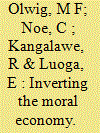

|
|
|
|
|
| Summary/Abstract |
Governments, donors and investors often promote land acquisitions for forest plantations as global climate change mitigation via carbon sequestration. Investors’ forestry thereby becomes part of a global moral economy imaginary. Using examples from Tanzania we critically examine the global moral economy’s narrative foundation, which presents trees as axiomatically ‘green’, ‘idle’ land as waste and economic investments as benefiting the relevant communities. In this way the traditional supposition of the moral economy as invoked by the economic underclass to maintain the basis of their subsistence is inverted and subverted, at a potentially serious cost to the subjects of such land acquisition.
|
|
|
|
|
|
|
|
|
|
|
|
|
|
|
|
| 5 |
ID:
142660
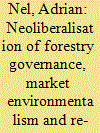

|
|
|
|
|
| Summary/Abstract |
There is often a disjuncture between idealised forestry governance models which posit a ‘win-win for community and environment’ through participatory, multi-stakeholder international development discourses and interventions – and the actually existing processes and structures of natural resource government through which they are articulated. By applying, first, established theorisations of the initial territorialisation of state forestry territory, then conceptualisations of re- and de-territorialisation, derived from Deleuzo-Guattarian formulations, this paper expands on post-structuralist lines of inquiry on the political ecology of forestry to explore substantive transformations in forestry governance in Uganda. It specifically details the role that market environmentalism – the extension of market mechanisms, including carbon forestry, to natural resource governance – plays in reorienting assemblages of actors engaged in forestry governance and in changing configurations of state forestry territory.
|
|
|
|
|
|
|
|
|
|
|
|
|
|
|
|
| 6 |
ID:
142662
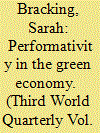

|
|
|
|
|
| Summary/Abstract |
This paper asks how far performativity in the Green Economy generates material or virtual assets. It examines the relationship between assets and their financial derivatives, asking how far the value of ‘carbon’ or ‘green’ can be directly attributed to its social and narrative construction. The paper draws on two case studies – one of the Clean Development Mechanism (CDM) in South Africa, the other of the global private green bonds market – to show that both public and private climate finance can generate virtual economic activity co-produced by processes of social valuation and accumulation proper. How reliant is the Green Economy on actual economic activity?
|
|
|
|
|
|
|
|
|
|
|
|
|
|
|
|
| 7 |
ID:
142659
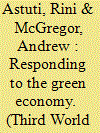

|
|
|
|
|
| Summary/Abstract |
This paper analyses the technologies of government that proponents of the Reducing Emissions from Deforestation and forest Degradation (REDD+) mechanism are adopting to influence forest governance in Indonesia. It analyses the aspects of forest governance being problematised; the solutions being constructed; and who is influencing the production and content of these solutions. The research focuses on three aspects of the One Map Initiative: the forest moratorium; forest licensing; and new standards in participative mapping. Our findings show that the initiative has created new opportunities and constraints for forest reform. New disciplinary and participatory technologies have emerged that have created political spaces for activists to actively promote social and environmental justice concerns. However, our analysis also shows tensions for forest stakeholders between engaging in the new opportunities of the green economy and the risk of having political issues rendered technical.
|
|
|
|
|
|
|
|
|
|
|
|
|
|
|
|
| 8 |
ID:
142657
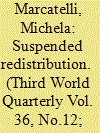

|
|
|
|
|
| Summary/Abstract |
In this article I show how ideas and practices of ‘green economy’ can reproduce and even naturalise inequality in water access for local users. Evidence to support my argument is drawn from the Waterberg region in the Limpopo Province of South Africa. Following the demise of apartheid and the appeal of the green economy, the Waterberg has been ‘reinvented’ as a wildlife destination. Whereas game farms enjoy secure water supply, the rural poor relocated to the small town of Vaalwater suffer severe water shortages. The article questions the mainstream view according to which game farms have no relationship to the water problems in town. Rather, I suggest that by conceiving and managing water as a private commodity deriving from land ownership and largely unregulated by the state, green economy initiatives contribute both materially and discursively to hampering more equality in water redistribution.
|
|
|
|
|
|
|
|
|
|
|
|
|
|
|
|
| 9 |
ID:
142656
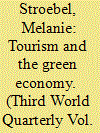

|
|
|
|
|
| Summary/Abstract |
This paper investigates how tourism stakeholders conceptualise tourism in a green economy and how they foresee the transition to progress. With the meaning of a green economy remaining contested, the political agenda that the concept entails in a particular context can be far from clear. The paper provides a qualitative analysis of Towards a Green Economy and the publication Green Growth and Travelism to explore the implementation strategies and political agendas of tourism stakeholders. It outlines how stakeholders argue in line with international organisations that tourism can contribute to growth, development and poverty alleviation, while reducing environmental impacts. However, some researchers challenge the foundations of the green growth discourse. An exploration of these contradictions and of the political and economic implications of climate change leads the paper to argue that the particular framing of the green economy presents tourism in a way that sets the industry up for continued growth, while marginalising a much-needed radical transformation.
|
|
|
|
|
|
|
|
|
|
|
|
|
|
|
|
|
|
|
|
|